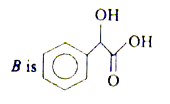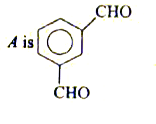An organic compound (A) on treatment with acetic acid in the presence of sulphuric acid produces an ester (B). (A) on mild oxidation gives (C),(C) with 50% potassium hydroxide followed by acidification with dilute hydroxide acid generates (A) and (D),(D) with phosphorus pentachloride followed by reaction with ammonia gives (E),(E) on dehydration produces hydrocyanic acid. Identify the compounds (A),(B),(C),(D), and (E).
The correct Answer is:A=CH3OH(Methanol)B=CH3COOCH3(Methyl ethanoate)C=HCHO(Methanal)D=HCOOH(Methanoic acid)E=HCONH2(Formamide or methanamide)
Step by step video & image solution for An organic compound (A) on treatment with acetic acid in the presence of sulphuric acid produces an ester (B). (A) on mild oxidation gives ( C), ( C) with 50 % potassium hydroxide followed by acidification with dilute hydroxide acid generates (A) and (D) ,(D) with phosphorus pentachloride followed by reaction with ammonia gives (E) , (E) on dehydration produces hydrocyanic acid. Identify the compounds (A), (B), (C), (D), and (E). by Chemistry experts to help you in doubts & scoring excellent marks in Class 12 exams.
Updated on:21/07/2023Topper's Solved these Questions
- ALKENE, ALKANE & ALKYNE BOOK - ALLENCHAPTER - ALKENE, ALKANE & ALKYNE EXERCISE - EXCERSISE-1
25 Videos
- ALKENE, ALKANE & ALKYNE BOOK - ALLENCHAPTER - ALKENE, ALKANE & ALKYNE EXERCISE - EXCERSISE-2
20 Videos
- ALKENE, ALKANE & ALKYNE BOOK - ALLENCHAPTER - ALKENE, ALKANE & ALKYNE EXERCISE - EXERCISE-5[A]
68 Videos
- AIIMS 2019BOOK - ALLENCHAPTER - AIIMS 2019EXERCISE - CHEMISTRY
40 Videos
- ALKYL AND ARYL HALIDEBOOK - ALLENCHAPTER - ALKYL AND ARYL HALIDEEXERCISE - EXERCISE-05 (B)
35 Videos
Similar Questions
Knowledge Check
Compound (A) C8H6O2 on treatment with aq. NaOH followed by acidification gives (B) C3H2O3 which on oxidation gives benzoic acid only:
A B
B C
C D
D
A halogen compound 'A' on hydrolysis with dilute alkali followed by acidification gives acetic acid. The compound X is :
AClCH2CH2ClBCH3CHCl2CClCH2CHCl2DCH3CCl3
Give equations for the reaction of acetic acid with potassium hydroxide
View SolutionAn aliphatic hydrocarbon A on treatment with sulphuric acid in the presence of HgSO4 yields a liquid B with molecular formula C2H4O. Bon oxidation with acidified potassium dichromate yields C which gives effervescence with sodium bicarbonate. C when treated with SOCl2 gives D. When D reacts with ethanol it gives a sweet smelling liquid E. E is also formed when C reacts with ethanol in the presence of conc. H2SO4.
Identify A, B, C, D and E.
View Solution(i) An organic compound A with molecular formula C7H8 on oxidation by chromyl chloride in the presence of CCl4 gives a compound B which gives positive Tollen's test. The compound B on treatment with NaOH followed by acid hydrolysis gives two product C and D. C on oxidation gives B which on further oxidation gives D. the compound D on distillation with sodalime gives a hydrocarbon E. Below 60∘C, concentrated nitric acid reacts with E in the presence of concentrated sulphuric acid forming a compound F. identify the compounds A,B,C,D,E and F.
(ii) Give chemical test to distinguish : Formaldehyde and acetaldehyde.
View SolutionAn organic compound (A) on treatment with ethyl alcohol gives a carboxylic acid (B) and compound (C). The hydrolysis of (C) under acidic conditions gives (B) and (D). Oxidation of (D) with KMnO4 also gives (B). (B) on heating with Ca(OH)2 gives (E) (molecular formula, C3H6O). (E) does not give Tollens test and does not reduce Fehling's solution but forms a 2,4−dinitrophenyl hydrazone. Identify (A),(B),(C),(D), and (E).
View SolutionA halogen compound 'A' on hydrolyses with dilute alkali followed by acidification gives acetic acid. The compound X is:
View SolutionGive reason for the following:
Potassium and sodium are not used for reaction with dilute hydrochloric acid or dilute sulphuric acid in laboratory preparation of hydrogen.
View Solution
